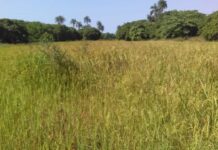The Gambia is confronting challenges which require a leadership that listens and a people that reason to be addressed. Any leader  who goes to sleep while another political leader like him or her is put behind bars in a maximum security wing of a prison for political reasons must be out of touch with the vicissitudes of destiny.
who goes to sleep while another political leader like him or her is put behind bars in a maximum security wing of a prison for political reasons must be out of touch with the vicissitudes of destiny.
Gambia is faced with an electoral cycle commencing with the 1st December Presidential election. It is inconceivable for one to have an environment conducive for holding election while the key executive members of a major opposition party are put behind bars for political reasons.
It is important to state the circumstances which have led us to the current political crisis and then point out a way forward.
On the 14th of April, 2016, a major debate on coalition building was scheduled to take place over West Coast Radio. A programme launched by the youth parliament started by inviting APRC stalwarts, like the majority leader, and eventually opened up to include the leaders of other political parties. The presenters were increasingly becoming very critical in engaging political figures thus contributing to the birth of a media opened to divergent views and dissenting opinion, as dictated by the Constitution.
The programme was supposed to commence at 7 pm and all the political leaders in the opposition, who are resident in the Gambia, were reported to have been invited.
Prior to going to the station, at about 3pm, I received information that some youths were assembled at West Field to protest for electoral reform. They were reported to have been dispersed and arrested by a contingent of the police intervention unit within minutes. Solo Sandeng was reported to be the leader. He was reported to have said that he was part of a non partisan protest in his personal capacity, and not as the UDP Organising Secretary.
I was the first to reach the Radio Station. Mr Darboe drove himself to the station unaccompanied by anyone. The two of us were the only political leaders present but the programme was aborted by the management.
We continued to monitor developments regarding the detainees. On Friday, information about the possible death of Solo Sandeng began to spread.
We sent an emissary to his family for confirmation and found them in great distress and anguish. He was referred to Mr Darboe for more information. He visited Mr Darboe and returned to explain what he said. We then began our investigation.
The pain and anguish that would grip any person of conscience, when raw death of loved ones is alleged, could lead to any form of protest to show one’s outrage.
The Constitution is clear. There would be no room for speculation if a person who is arrested and detained is informed and availed an opportunity “…..within three hours, in a language that he or she understands, of the reasons of his or her arrest, or detention, or of his or her right to consult a legal practitioner” as required by Section 19 of the Constitution.
There would be no injury or unnatural death in detention if Section 21 of the Constitution is adhered to. It states that “no person shall be subject to torture or inhuman degrading punishment or other treatment.”
The fact that Solo Sandeng, Fatoumata Jawara and Nogoi Njie are yet to make court appearances raises more questions regarding their whereabouts. Needless to say, it would constitute a national tragedy of monumental proportion if they disappear without trace after being known to be under arrest and detention.
We are aware of the anguish and pain that their families are undergoing, which they share with all men and women of conscience.
Substantive justice holds that when action is dictated by conscience, criminal intent should not be alleged.
The way forward is to discharge those accused because of the two protests, come out plain with those arrested who have not been making court appearances, cooperate with the inter-party committee in order to create the level ground sought for holding elections whose results all stakeholders would accept.
Two lessons are of paramount importance to the main stream opposition parties and the public.
A government that condones brutality and repression is likely to be isolated by even its supporters. On the other hand, the main stream opposition parties, which adopt strategies that are not approved by the vast majority of voters, are likely to become isolated from them.
Hence if we are to have a peaceful way forward, we must have a government that is ready to listen and remedy wrong, and a people who reason and oppose everything that is wrong and give support to everything that is right, irrespective of party affiliation.
To conclude, outside the realm of mainstream politics there will always be threats of coup d’états, mass uprisings, suicide bombings and armed struggles. There will be accusations and counter accusations of who is doing right and who is doing wrong. The truth of the matter however is that all Gambians irrespective of party affiliation, or political shades of opinion want an outcome that will enable the people to live in liberty, dignity and prosperity. The only correct strategy is one that would lead to such an outcome in the shortest possible time.
That is the verdict of truth and reason and it is incontrovertible. PDOIS will strive to attain such an eventuality as a party and in collaboration with others as long as we see eye to eye on how to proceed to achieve such an aim.




















